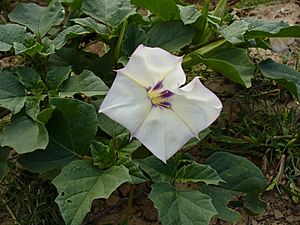Desert thorn-apple facts for kids
Quick facts for kids Desert thorn-apple |
|
|---|---|
 |
|
| Scientific classification | |
| Genus: |
Datura
|
| Species: |
discolor
|
The desert thorn-apple (Datura discolor) is a type of plant that grows every year. It's found naturally in the Sonoran Desert in western North America. You can often spot it in sandy areas and dry riverbeds called washes. This plant has special chemicals called alkaloids in all its parts. These chemicals can be very harmful if someone eats them.
What is the Desert Thorn-Apple?
Scientists first described this plant in 1833. Its scientific name, discolor, means 'various colors.' This name describes its beautiful trumpet-shaped flowers. The flowers are white at the wide opening, and then change to pale or dark purple closer to the stem.
This plant can grow as an upright or low-lying shrub, reaching up to about 4.5 feet (1.4 meters) tall. Its leaves are light green, and its stems often have noticeable purple stripes. The leaves are shaped like an oval and can be smooth or have small teeth along their edges.
Datura discolor has the biggest flowers of all Datura plants, sometimes growing up to 6.5 inches (16.5 cm) across! This makes it a popular plant for gardens. However, its flowers only open for one night and then wilt the next day. The plant's seed pod is spiky, like most other Datura plants. It can be up to 3 inches (7.6 cm) long and 2.5 inches (6.4 cm) wide.
This plant naturally grows from Mexico up to the Southwestern United States and also in the Caribbean Islands. It loves sunshine and grows well in places where it can get plenty of light. It can even grow under overhanging roofs, which helps protect its delicate flowers from rain.
Why is this Plant Dangerous?
All parts of Datura plants contain dangerous levels of natural chemicals that can be poisonous. If humans or animals, including farm animals and pets, eat any part of these plants, it can be very harmful. Because of how dangerous they are, in some places it is against the law to buy, sell, or even grow Datura plants.
Images for kids


